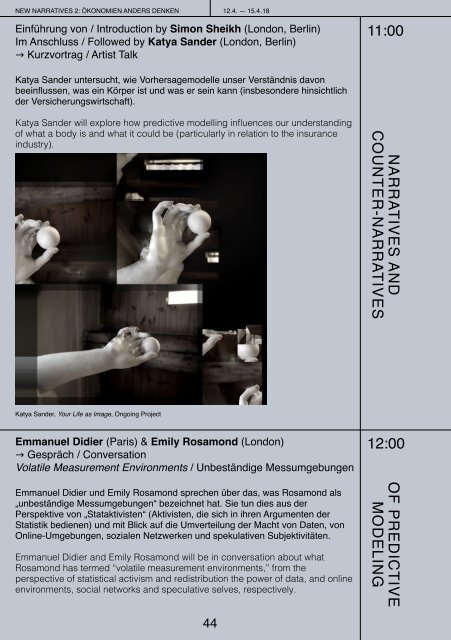RZ_NN2_Heft_A5_kleineDatei_5MB
Create successful ePaper yourself
Turn your PDF publications into a flip-book with our unique Google optimized e-Paper software.
NEW NARRATIVES 2: ÖKONOMIEN ANDERS DENKEN 12.4. — 15.4.18<br />
Einführung von / Introduction by Simon Sheikh (London, Berlin)<br />
Im Anschluss / Followed by Katya Sander (London, Berlin)<br />
→ Kurzvortrag / Artist Talk<br />
11:00<br />
NEW NARRATIVES 2: THINKING ECONOMICS DIFFERENTLY<br />
14:00<br />
SONNTAG / SUNDAY<br />
Suhail Malik (London) → Vortrag / Lecture<br />
System Constructions of the Unnarratable Future /<br />
Systembauweisen einer nicht-erzählbaren Zukunft<br />
Katya Sander untersucht, wie Vorhersagemodelle unser Verständnis davon<br />
beeinflussen, was ein Körper ist und was er sein kann (insbesondere hinsichtlich<br />
der Versicherungswirtschaft).<br />
Katya Sander will explore how predictive modelling influences our understanding<br />
of what a body is and what it could be (particularly in relation to the insurance<br />
industry).<br />
Katya Sander, Your Life as Image, Ongoing Project<br />
Emmanuel Didier (Paris) & Emily Rosamond (London)<br />
→ Gespräch / Conversation<br />
Volatile Measurement Environments / Unbeständige Messumgebungen<br />
Emmanuel Didier und Emily Rosamond sprechen über das, was Rosamond als<br />
„unbeständige Messumgebungen“ bezeichnet hat. Sie tun dies aus der<br />
Perspektive von „Stataktivisten“ (Aktivisten, die sich in ihren Argumenten der<br />
Statistik bedienen) und mit Blick auf die Umverteilung der Macht von Daten, von<br />
Online-Umgebungen, sozialen Netzwerken und spekulativen Subjektivitäten.<br />
Emmanuel Didier and Emily Rosamond will be in conversation about what<br />
Rosamond has termed “volatile measurement environments,” from the<br />
perspective of statistical activism and redistribution the power of data, and online<br />
environments, social networks and speculative selves, respectively.<br />
NARRATIVES AND<br />
COUNTER-NARRATIVES<br />
12:00<br />
OF PREDICTIVE<br />
MODELING<br />
NARRATIVES AND COUNTER-NARRATIVES<br />
OF PREDICTIVE MODELING<br />
Heutzutage sind integrative Gesellschaften, die sich durch Größe und Komplexität<br />
auszeichnen, auf automatisierte algorithmische Systeme angewiesen, die<br />
ihr störungsfreies Funktionieren garantieren. Vorhersagemodelle schränken den<br />
Auswahlbereich, mit dem solche Systeme operieren, ein – oft im Sinne historisch<br />
gewachsener Tendenzen und Vorlieben. Als Effekt davon werden Benutzeroptionen<br />
limitiert, das Spektrum verfügbarer Informationen und Wahlmöglichkeiten<br />
werden eingeschränkt. Andererseits minimiert diese funktionale Beschränkung die<br />
Schwankungen, welche automatisierte algorithmische Systeme erzeugen, wenn<br />
sie zukünftige Eventualitäten vorhersagen. Genau diese funktionale Normalisierung<br />
wird in die Normativität beschränkter Wahl überführt. Besorgt wird dieser<br />
Prozess der Übertragung durch die semantische Strukturierung von Erzählungen.<br />
Trotz aller Einschränkungen haben Vorhersagemodelle also stabilisierende<br />
Effekte, indem sie die Risiken und Schwankungen in automatisierten algorithmischen<br />
Systemen minimieren. Sie tun dies zum Zweck sozialen, narrativen, technischen<br />
und finanziellen Zusammenhalts. Allerdings sind das Narrative und das Normative<br />
gegenwärtig ohnehin bereits überwunden und überboten worden – das zeigt<br />
schon die überwältigende Dynamik von Social Media an. Die allgegenwärtigen<br />
Konstrukte der Hochgeschwindigkeits-Kommunikation – Selbstverliebtheit,<br />
Unmittelbarkeit, Reaktionsgeschwindigkeit, Inszenierung, Stürme der Entrüstung,<br />
der Kränkung und der Diffamierung – markieren den Untergang der historischen<br />
Voraussetzungen sozialen und individuellen Zusammenhalts. Stattdessen<br />
zeigt sich, dass die Nicht-Erzählbarkeit der Zukunft integraler Bestandteil von<br />
automatisierten algorithmischen Systemen ist. Like. Share. Retweet ist nicht<br />
gleich Zustimmung. Trump.<br />
Complex, large-scale, integrated societies now rely on automated algorithmic<br />
systems for their regular functioning. Predictive modelling constrains the range of<br />
selection such systems operate with, often according to historical biases.<br />
As a result the range of user options gets closed down, the information spectrum<br />
narrows, choices become more limited. But the other side of such a functional<br />
constraining is that it lessens the risk and volatility generated by automated<br />
algorithmic systems as they contrive currently unknown contingencies by running<br />
into the future. It is this functional normalising that is converted into the social<br />
normativity of constrained choice. The transmission process for that conversion<br />
is the semantic structuring of narrative For all of its constraining effects, then,<br />
predictive modelling stabilises the otherwise overwhelming risk and volatility<br />
embedded in automated algorithmic systems. They do so for the sake of social,<br />
narrative, technical and financial coherence. Yet, the surpassing of narrativity<br />
and normativity is already current, evidenced in the prevailing dynamics of social<br />
media. The ubiquity of high-velocity communicative constructs of self-affection,<br />
immediacy, reactivity, display, the scandals of outrage, hurt and denigration that<br />
succeed on social media platforms—all of this marks the demise of the historical<br />
conditions of social and individual cohesion. What is instead indexed there is<br />
the unnarratable futurity intrinsic to automated algorithmic systems. Like. Share.<br />
Retweeting is not endorsement. Trump.<br />
44<br />
45


